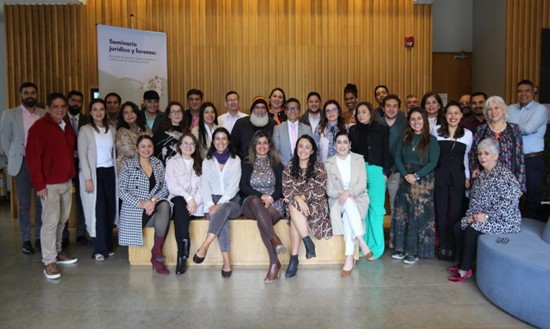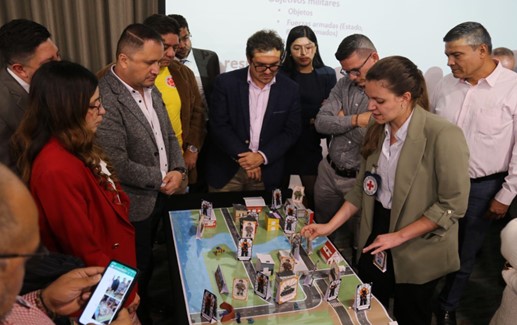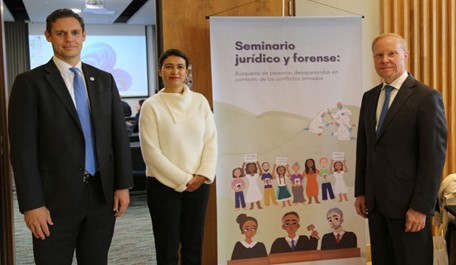
Seminar participants. Photo: Judges of ordinary and military criminal justice; Representatives of the ICJ: Carolina Villadiego, Angélica Porto and Mercedes Castilla; Representatives of the International Committee of the Red Cross: Rafael de Abreu e Souza, Paula de Gamboa; and Representatives of Documenta Mexico: Fatima Osorio.
The ICJ, jointly with the International Committee of the Red Cross (ICRC), held a seminar in Bogotá from 10-13 September, with the participation of 39 for judges with criminal jurisdiction from both ordinary and military courts.
The seminar considered how to best use law and forensic science to effectively search disappeared persons in armed conflicts. The 27 judges from the ordinary and 12 from the military jurisdiction came from such municipalities of Colombia, such as Chigorodó, Medellín, Saravena, Malambo, Cartagena, Salamina, Tres Esquinas, Florencia, La Arandia, Yopal, Villeta, Tuchín, Acacías, Ipiales, Pasto, Ocaña, Barrancabermeja, Sincelejo, Ibagué, Buenaventura, Cali and Bogotá.
The workshop deepened the knowledge of participants about the processes needed in the search for disappeared persons and the identification of deceased individuals, as well as building their capacities on international human rights law and international humanitarian law applicable to these cases. This included the use of the Minnesota and Istanbul Protocols, which respectively concerned investigations of unlawful deaths and torture.

(From left to right – Judges) Wilson Traslaviña, Luis Alberto Martinez, Lilian Juliana Suarez Amador, Guillermo Vela, Javier Elias Diaz Martine, Alexander Diaz Pedroso, Daniel Ortega, Deisy Pilar Sanchez Quintero, from Military Criminal Justice, Three Corners Base; Ader Jose Vergara, and Melina Fidelis, legal advisor to the International Committee of the Red Cross.
Participants examined the forensic considerations around identifying missing persons and cases of potential occurrence of torture and the role of genetics in the identification of victims. Additionally, the seminar addressed the question of mental health and psychosocial support for survivors and the need to include procedural accommodations to ensure access to justice for persons with disabilities.
The judges who participated emphasized the importance of having clear and up-to-date information on international human rights and international humanitarian law standards to effectively address violations and abuses committed in their municipalities. In particular, judges working in areas like Urabá and Casanare, which have suffered violence at the hands of armed groups, highlighted how these standards enable them to better understand victims and survivors, empathize with their situation, and apply legal tools that facilitate their access to justice, truth, and reparation.
The seminar provided a space for learning and reflection for Colombian judges, who gained valuable tools to address the challenges posed by armed conflicts. As the country advances in its quest for truth, justice, and reparation, the proper application of international law and standards must be a cornerstone in ensuring the protection of human rights and the dignity of victims, as well as accountability for victims and survivors.
The workshop was convened with the support of the Finnish Ministry of Foreign Affairs.

(From left to right) Head of the delegation of the International Committee of the Red Cross in Colombia, Patrick Hamilton; leader of the ICJ Latin America team, Carolina Villadiego; and the Ambassador of Finland, Antti Kaski.




